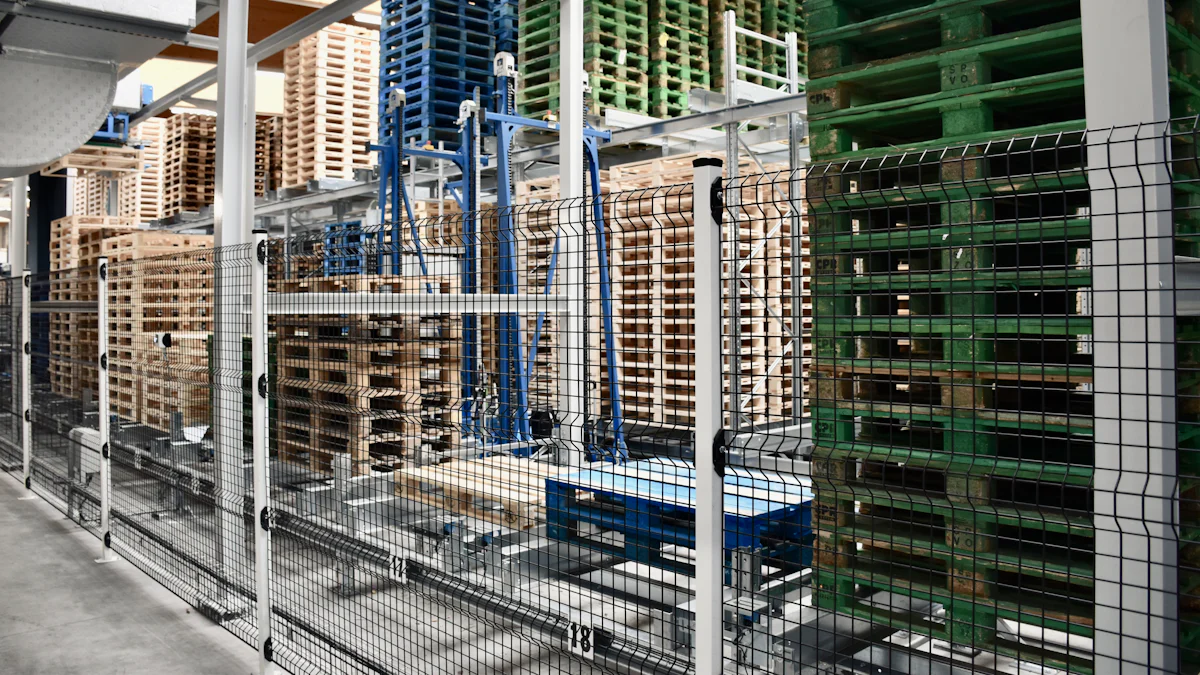How Intelligent Supply Chain Solutions Accelerate the Shift of Chinese Manufacturers to Independent Brand Ownership

The landscape of Chinese manufacturing has seen rapid growth and transformation. In June 2024, industrial production in China experienced a 5.3% growth compared to the previous year. Manufacturers now recognize the importance of independent brand ownership. This shift allows for greater control over product quality and market positioning. Recent legal changes in China have also enhanced trademark protection, encouraging manufacturers to build their own brands. Intelligent Supply Chain Solutions act as a catalyst in this transition, providing advanced technologies that streamline operations and improve efficiency.
Understanding Intelligent Supply Chain Solutions

Definition and Key Components
Advanced Technologies (AI, IoT, Big Data)
Intelligent Supply Chain Solutions leverage advanced technologies to enhance supply chain operations. Artificial Intelligence (AI) provides predictive capabilities that improve decision-making and optimize processes. AI can predict item returns, supplier reliability, and labor needs. The Internet of Things (IoT) offers real-time monitoring, ensuring transparency and efficiency. IoT systems track goods from production to delivery, providing valuable data at each stage. Big Data analytics deliver insightful information, enabling supply chains to be more responsive and customer-centric. Big Data helps identify trends, forecast demand, and manage inventory effectively.
Integration and Automation
Integration and automation are crucial components of Intelligent Supply Chain Solutions. Integration connects various elements of the supply chain, creating a seamless flow of information. This connectivity ensures that suppliers, manufacturers, and customers work in harmony. Automation streamlines repetitive tasks, reducing human error and increasing efficiency. Automated systems handle tasks such as order processing, inventory management, and shipment tracking. These systems free up human resources for more strategic activities, enhancing overall productivity.
Benefits of Intelligent Supply Chain Solutions
Efficiency and Cost Reduction
Intelligent Supply Chain Solutions significantly improve efficiency and reduce costs. Automated processes minimize manual intervention, speeding up operations. Real-time data allows for quick adjustments, preventing delays and reducing waste. Predictive analytics help optimize inventory levels, avoiding overstocking and stockouts. Efficient resource utilization leads to lower operational costs, benefiting the entire supply chain.
Enhanced Decision-Making
Enhanced decision-making is a key benefit of Intelligent Supply Chain Solutions. AI analyzes large volumes of data, providing actionable insights. Decision-makers can rely on accurate forecasts and trend analyses. This data-driven approach reduces uncertainty and improves strategic planning. Companies can make informed decisions about production schedules, inventory levels, and distribution strategies.
Improved Customer Satisfaction
Improved customer satisfaction results from the implementation of Intelligent Supply Chain Solutions. Real-time tracking and monitoring ensure timely deliveries, meeting customer expectations. Accurate demand forecasting helps maintain optimal stock levels, preventing shortages. Enhanced visibility into the supply chain allows for proactive issue resolution. Satisfied customers lead to increased loyalty and repeat business, driving long-term success.
The Shift of Chinese Manufacturers to Independent Brand Ownership
Historical Context and Current Trends
OEM to ODM to OBM (Original Brand Manufacturer)
Chinese manufacturers have evolved from Original Equipment Manufacturers (OEM) to Original Design Manufacturers (ODM) and now to Original Brand Manufacturers (OBM). Initially, many companies focused on producing goods for foreign brands. This approach provided a steady revenue stream but limited control over product design and branding. Over the past two decades, a significant shift has occurred. Companies now prioritize creating and owning their brands.
The transition from OEM to OBM offers several advantages. Manufacturers gain greater control over product quality and innovation. Ownership of brands allows for better market positioning and customer loyalty. For example, the trademark case of Sony Ericsson in China highlighted the importance of brand ownership. A Chinese individual acquired the brand due to an abbreviation of its name, emphasizing the need for robust brand management.
Market Demand and Consumer Preferences
Market demand and consumer preferences have driven the shift toward independent brand ownership. Chinese consumers increasingly prefer domestic brands that offer high quality and innovation. This trend aligns with the global rise in demand for unique and authentic products. Manufacturers recognize the potential for higher profit margins and market share through brand ownership.
Consumer preferences also influence product development and marketing strategies. Brands that understand and cater to local tastes and trends enjoy a competitive edge. The ability to respond quickly to market changes enhances brand reputation and customer satisfaction. Intelligent Supply Chain Solutions support this agility by providing real-time data and analytics.
Challenges Faced by Chinese Manufacturers
Competition and Market Saturation
Chinese manufacturers face intense competition and market saturation. The rapid growth of the manufacturing sector has led to a crowded marketplace. Companies must differentiate themselves through innovation and quality. Establishing a strong brand identity becomes crucial in such an environment.
Market saturation poses additional challenges. Manufacturers must navigate complex supply chains and distribution networks. Efficient resource management and cost control become essential. Intelligent Supply Chain Solutions offer tools to optimize operations and maintain competitiveness.
Brand Recognition and Trust
Building brand recognition and trust remains a significant challenge. Many Chinese brands struggle to establish a presence in international markets. Consumers often associate quality and reliability with established foreign brands. Overcoming this perception requires consistent delivery of high-quality products and effective marketing strategies.
Trust plays a crucial role in brand success. Manufacturers must ensure transparency and accountability in their operations. Real-time tracking and monitoring of supply chains enhance credibility. Intelligent Supply Chain Solutions provide the necessary infrastructure to build and maintain trust with consumers.
Role of Intelligent Supply Chain Solutions in Facilitating the Shift
Streamlining Operations
Inventory Management
Intelligent Supply Chain Solutions revolutionize inventory management. AI-driven systems predict inventory needs with high accuracy. This prediction minimizes overstocking and stockouts. IoT devices monitor inventory levels in real time. These devices provide data on stock movements and storage conditions. Big Data analytics process this information to optimize inventory turnover. Efficient inventory management reduces holding costs and improves cash flow.
Production Planning
Production planning benefits significantly from Intelligent Supply Chain Solutions. AI algorithms analyze production data to optimize schedules. These algorithms consider factors such as demand forecasts and resource availability. IoT sensors track machinery performance and maintenance needs. This tracking ensures minimal downtime and maximizes production efficiency. Big Data analytics identify trends and patterns in production processes. These insights enable continuous improvement and cost reduction.
Enhancing Market Responsiveness
Real-Time Data Analytics
Real-time data analytics enhance market responsiveness. Intelligent Supply Chain Solutions collect data from various sources. AI processes this data to provide actionable insights. Companies can quickly adapt to market changes based on these insights. Real-time data allows for immediate adjustments in supply chain operations. This agility improves customer satisfaction and competitive advantage.
Demand Forecasting
Demand forecasting becomes more accurate with Intelligent Supply Chain Solutions. AI analyzes historical sales data and market trends. This analysis predicts future demand with high precision. IoT devices provide real-time sales data from various channels. Big Data analytics integrate this information to refine forecasts. Accurate demand forecasting ensures optimal stock levels and timely deliveries. This accuracy enhances customer satisfaction and reduces operational costs.
Real-World Applications and Future Prospects

Industry-Specific Implementations
Electronics and Technology
Intelligent Supply Chain Solutions have revolutionized the electronics and technology sectors. Companies like JUSDA utilize advanced technologies such as AI, IoT, and Big Data to enhance supply chain efficiency. AI-driven systems predict component needs accurately, reducing delays in production. IoT devices provide real-time monitoring of inventory levels and shipment status. This transparency ensures timely deliveries and reduces the risk of stockouts.
Big Data analytics play a crucial role in managing complex supply chains. These analytics help identify trends and optimize resource allocation. For example, manufacturers can adjust production schedules based on real-time demand forecasts. This agility improves customer satisfaction and reduces operational costs. Leading SCM software companies offer robust reporting and analytics capabilities, enhancing decision-making processes.
Apparel and Textiles
The apparel and textiles industry also benefits significantly from Intelligent Supply Chain Solutions. Automation streamlines tasks such as order processing and inventory management. This efficiency reduces human error and increases productivity. IoT systems track goods from production to delivery, ensuring transparency and accountability.
Big Data analytics provide valuable insights into consumer preferences and market trends. Manufacturers can adjust their strategies based on these insights, enhancing their competitive edge. Efficient inventory management reduces holding costs and improves cash flow. Real-time data allows for quick adjustments, preventing overstocking and stockouts.
Future Trends and Innovations
Emerging Technologies
Emerging technologies will continue to shape the future of supply chain management. AI and machine learning will provide even more accurate predictions and optimizations. These technologies will enhance decision-making and operational efficiency. IoT integration will expand, offering greater transparency and control over supply chain processes.
Blockchain technology will play a significant role in ensuring data security and transparency. This technology will provide an immutable record of transactions, enhancing trust among stakeholders. Advanced robotics will automate more tasks, further increasing productivity and reducing costs.
Evolving Consumer Expectations
Consumer expectations will continue to evolve, driving changes in supply chain management. Customers demand faster deliveries and greater transparency. Intelligent Supply Chain Solutions will enable companies to meet these demands. Real-time tracking and monitoring will ensure timely deliveries and enhance customer satisfaction.
Sustainability will become a critical factor in consumer choices. Companies will need to adopt eco-friendly practices to meet these expectations. Intelligent Supply Chain Solutions will help optimize resource utilization and reduce waste. This approach will enhance brand reputation and customer loyalty.
Intelligent supply chain solutions play a pivotal role in modern manufacturing. AI, IoT, and Big Data technologies drive efficiency, visibility, and responsiveness. These solutions enable Chinese manufacturers to transition to independent brand ownership. Enhanced decision-making and streamlined operations result from these advanced technologies. The future of Chinese manufacturing looks promising with continued technological integration. Intelligent supply chain solutions will remain essential for maintaining competitiveness and achieving sustainability.
See Also
AI Supply Chain Innovations: Unlocking Efficiency
Reshaping Industries: Cloud Supply Chain Solutions Revolution
Tomorrow's Logistics Revolution: AI Supply Chain
Redefining Supply Chain Management: Cloud-Based Solutions
Cross-Border E-commerce Unveiled: Innovative Solutions for Supplier Relationships
